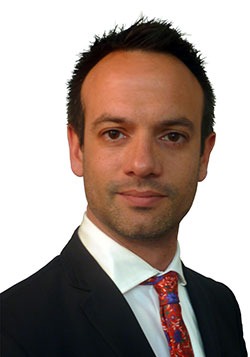Geography Speaker Series: Hugues Lantuit

The final speaker in the Geography Speaker Series is Dr. Hugues Lantuit (Alfred Wegener Institute for Polar and Marine Research & University of Potsdam). He will be speaking about "Arctic coasts in a changing climate" on Friday, May 24 at 3:00 p.m. in SN 2025. The abstract can be found at the end of this post.
Dr. Hugues Lantuit is the leader of the coastal dynamics research group at the Alfred Wegener Institute for Polar and Marine Research in Potsdam, Germany. Dr. Lantuit has got a Maîtrise in Geography and Geology from Université Denis Diderot in Paris, France, a Masters of science in Geography from McGill University in Montréal, Canada and a PhD in Geosciences from the University of Potsdam in Germany. His science deals with the evolution of the permafrost landscapes in the Arctic, their reaction to climate change and its implication for the Earth Climate System. He focuses on the erosion of permafrost coasts and its impact on the environment and on local communities. His research is located both in Siberia and in the western Canadian Arctic, with a greater focus on the latter, with now over ten expeditions to the Northwest Territories and the Yukon over the past ten years.
Dr. Lantuit is the founder of the Permafrost Young Researchers Network (PYRN), the co-founder of the Association of Polar Early Career Scientists (APECS) and was a member of the Initiating Group of the Sustaining Arctic Observing Networks (SAON). He is now a member of the Executive Committee of the International Permafrost Association (IPA), after having been the Executive Director of the association between 2008 and 2012.
Abstract:
Arctic permafrost coasts, which account for 34% of the coasts of the Earth, are extremely vulnerable to climate change, because the frozen bluffs, upon contact with seawater, lose the cohesion provided by the permafrost matrix and are instantly washed away by incoming waves. With warming in the Arctic expected to be roughly twice as high as the global mean, sea ice extent is expected to decline dramatically and induce favourable conditions for coastal erosion. The subsequent impacts include threats to infrastructure and changes to the nearshore food-web through the release of sediment and organic matter to the ocean. A comprehensive understanding of the processes at work at the local level is nonetheless still lacking and impeding any kind of prognosis on the trajectory of erosion rates. In this presentation, we show recent efforts to understand the processes at work in the coastal zone and the impacts of the changing environment, with a greater focus on the western Canadian Arctic (Beaufort Sea) and eastern Siberia (Laptev Sea).